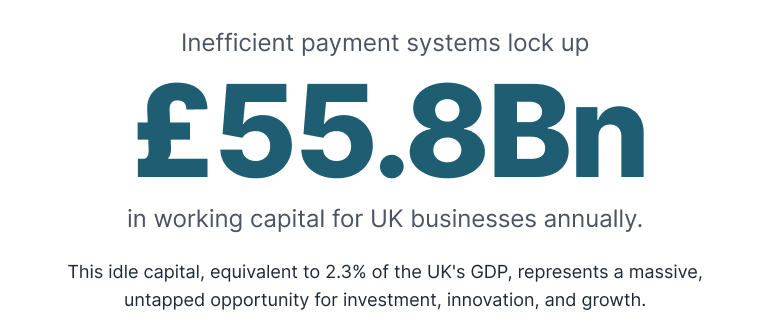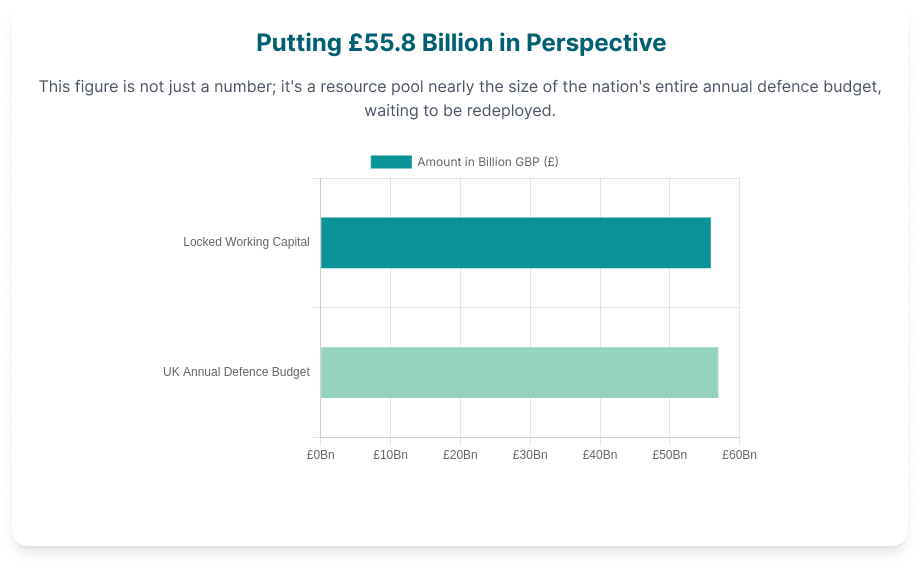The £55 Billion Payment Dividend

MODERNISING B2B PAYMENT RAILS COULD UNLOCK £55 BILLION FOR UK ECONOMY
Navro study reveals transformative impact of removing 2-3 day payments lags and liquidity buffers
6 November 2025 - London: Navro, the London-headquartered fintech that simplifies international payments, today releases research revealing that UK businesses could unlock £55.8 billion of working capital by modernising corporate payment systems – a figure equivalent to 2.3% of GDP and just under the nation’s annual defence budget1.
Navro’s study, The £55 Billion Payment Dividend, assessed publicly available data from the Office of National Statistics2 and found that £55.8 billion is locked up each year in idle capital due to the inefficiencies of business payment systems – this, despite all the fintech investment in recent years to tackle such issues.

The sum of £55.8 billion could be released by:
- Eliminating the 2-3 day payment lags common in commercial transactions. Irrespective of the specific contractual payment terms, many payments still take 2-3 days to arrive in the recipient’s bank accounts after the payment has been processed
- Reducing the buffers businesses hold unnecessarily with liquidity parked in suspense or nostro accounts to facilitate snail-pace payments
Aran Brown, CEO of Navro, said: “At a time when the country is struggling to achieve meaningful growth, some very simple changes to corporate payment systems could unleash £55 billion worth of working capital. Just think what businesses could do with that kind of money to fund investment, expand into new areas and upskill staff. In this day and age, there really is no excuse for waiting three days to receive a payment. Business leaders should be asking now how they can eliminate payment lags and reduce buffers of unproductive capital locked up to support payments.”
Further analysis of the data reveals that the £55.8 billion is at the conservative end of estimates. The ONS data suggests that UK businesses could access up to £167 billion of additional capital per year if they took even bolder measures, such as:
- Optimising payment processes; the ability of many businesses to support fast and efficient cross-border transactions is hindered by a number of related constraints: ongoing reliance on manual processes, a lack of integration between systems and the use of legacy or inappropriate technology. Businesses can process payments more efficiently, and thus unlock additional working capital, by streamlining workflows, automating manual tasks, and improving data exchange
- Introducing partial early payments; making a portion of a payment before the full payment is officially due holds advantages for both parties. For payers, there is the potential of supplier discounts and thus cost savings, better cash flow management as well as more loyal supplier relationships. Payees benefit from improved liquidity and reduced financial risk
- And further reducing buffers. Due to current inefficient payment systems, businesses hold excess liquidity to mitigate risks from payment delays or uncertainties. Making payment systems faster and more reliable means that businesses can reduce the amount of capital businesses hold in unproductive suspense or nostro accounts

Brown continued: “£167 billion is a staggering amount of money and the sum vividly illustrates how inefficient most payment set-ups are. Our research has looked at how much money the economy as a whole could unlock if businesses upgraded their payment capabilities. But, the figure has consequences for individual businesses too from a competitive point of view. Those firms that take the necessary steps to streamline and automate their payment processes and eradicate payment buffers will have considerably more financial firepower than those that do not.”
ENDS
1 = UK defence spending is expected to total £56.9 billion in 2024/25 - https://commonslibrary.parliament.uk/research-briefings/cbp-8175/?utm_source=chatgpt.com
Methodology
Data source:
- Office for National Statistics (2025) “UK sector (S.1): Other accounts receivable/payable (AF.8) – Level: Liability: Current price: £million: Not seasonally adjusted”, ONS Time Series NZBQ.
ONS figures reveal that there are £55.8bn of business-to-business invoices sitting unpaid at any one time. If businesses remove the 2–3 day payment lag by using better payment rails and the extra liquidity buffers—leaving 30-day terms untouched—they free up a conservative 10%, which is £55.8bn back into UK firms.
If businesses took these steps and also additional measures of optimising payment processes, introducing partial early payments and further reduced liquidity buffers, this could release a moderate 30% of the total for unpaid invoices – potentially unlocking £167 billion of working capital for UK businesses.
The ONS figure is for liabilities under AF.8 (other accounts receivable/payable) for the entire UK economy (S.1 sector). We used this as a proxy for trade-credit/working‐capital stock.
You can view the calculations at the following link: https://docs.google.com/spreadsheets/d/1NmPebdGneQkvdZNtQylr73pmsubEuhVp/edit?gid=1230480879#gid=1230480879
About Navro
Headquartered in London, Navro is on a mission to help online businesses navigate their growth into foreign markets with ease. Developing the world’s first payments curation platform, Navro turns the complex into simple — enabling businesses to access the best payment and banking infrastructure around the world, all through one contract and one API.



